Papers by Natthanai Prasannam
Intersections: Gender and Sexuality in Asia and the Pacific, 2023
Intersections: Gender and Sexuality in Asia and the Pacific, 2023
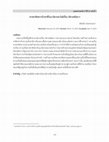
๋Journal of Human Sciences , 2021
Military Masculinity and Nationhood in the Yaoi Novel A Tale of Thousand Stars
Natthanai Prasann... more Military Masculinity and Nationhood in the Yaoi Novel A Tale of Thousand Stars
Natthanai Prasannam
Abstract
This article hopes to explore Bacteria’s A Tale of Thousand Stars (2016) with special reference to military masculinity and nationhood under the signifying system of the military romance. It is found that military masculinity is constructed through the image of man in uniform, desired muscularity along with the role of protecting Alpha. The characteristics validate the re-emergence of militarism in Thai popular culture after the coup d’état in 2014. The connotation of nationhood is rooted within uke’s vulnerable body conjuring the military protection. It also employs courtly love trope to illuminate seme’s loyalty to certain national institutions. In creating military masculinity and nationhood, the novel represents the otherness of periphery and the ethnic group through the urban vs rural dichotomy. Furthermore, the gendered rural space gives birth to uke’s new life: from feminized geo-body to masculinized body subjugating the rural world which embodies ethnic otherness, femininity, and childlike naivety.
Citation: Prasannam, N. (2021). Military Masculinity and Nationhood in the Yaoi Novel A Tale of Thousand Stars. Journal of Human Sciences, 22(1), 162-180.

วารสารศาสตร์ , 2020
Gender Distancing: Thai Yaoi Novels within the Politics of Literary Convention and Interpretation... more Gender Distancing: Thai Yaoi Novels within the Politics of Literary Convention and Interpretation
Abstract
Yaoi is the romance depicting male homosexual relationship mostly reimagined by female writers. Despite their homosexual contents, yaoi texts practice gender distancing. That is, the texts disregard the heterosexual relationship without defining their alternative romantic love through gay identities. This article hopes to analyze the politics behind gender distancing in the Thai yaoi novel through literary convention and interpretation of yaoi—in the lens of textualism and mode of reception. The analytical frame is conceived within the marriage between yaoi studies and popular romance studies. The case study is LazySheep’s The Read Thread (Dai Daeng). The analysis exposes the perpetual existence of gender distancing within the yaoi debates. The politics in literary convention of yaoi is to subscribe and challenge heteronormativity while simultaneously subverting homonormativity through the textual logic. As a Thai reincarnation romance, The Red Thread reassures the protagonists’ blessed reunion in their next lives rather than the assertion of gay identity. That is, Thai yaoi novels tend to endorse the pure love ideal beyond the ties of all genders or social issues.
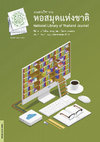
วารสารวิชาการหอสมุดแห่งชาติ , 2019
The Thai Yaoi Novel: An Analytical Study
The National Library of Thailand Journal
Natthanai Pr... more The Thai Yaoi Novel: An Analytical Study
The National Library of Thailand Journal
Natthanai Prasannam (2019)
This article aims at analyzing the Thai yaoi novel by exploring terminological problems derived from the Japanese context and situating the genre under the grammar of fiction and the romance novel. The analytical demonstration is conducted with MAME’s My Accidental Love Is You. The selected novel recounts the homoerotic relationship among male university students representing the nature of the yaoi genre in Thailand. Regarding the Thai yaoi novel as a well-made novel, the article analyzes its elements of fiction. The analysis of the novel’s structure within the plot development is embarked to extract the formula of the romance novel. The result should reaffirm the characteristics of the yaoi genre underlining the formula as well as its function indulging readers in an escape rather than offering a realistic substance.

Plaridel: A Philippine Journal of Communication, Media, and Society, 2019
This article aims to explore yaoi phenomenon in Thailand particularly during the 2010s at the hei... more This article aims to explore yaoi phenomenon in Thailand particularly during the 2010s at the height of the industry involvement with yaoi fandom. The article draws on Paul Booth's (2015) study of fan/ industry interaction to expand existing scholarship on yaoi phenomenon in Thailand which tends to focus on textual readings linking back to the Japanese cultural origin, ethnographic research, and the aspect of queer cultural politics. The study also draws attention to GMMTV Company Limited, a key player in expanding the yaoi industry in Thailand and growing the fandom of Thai yaoi stars in different countries in Asia. The article discusses the way GMMTV expands yaoi industry through connections with the local book industry as well as its own star and music making divisions. It pays close attention to fan/ industry interactions rooted in the industry-led mimetic practices inspired by yaoi fan culture. These practices include the act of "shipping" (pairing yaoi couples) through what fans referred to as Official Promotional Videos (OPVs) and television shows. The article then discusses the way GMMTV employs fan nostalgia to create memory-driven activities. The highly commercialized industry-led fan meeting also offers an interesting site to explore fan/industry interactions where fan-led practices were reenacted by the industry yet consumed by fans themselves.
วารสารอักษรศาสตร์ มหาวิทยาลัยศิลปากร, 2018
This article aims at exploring projects on “literature and history” in Thailand with a special fo... more This article aims at exploring projects on “literature and history” in Thailand with a special focus on how memory studies, as an interdisciplinary approach, can fertilize those former studies. It is found that the previous literature-and-history scholarship can be categorized as: 1) projects on historical images in literature and 2) projects on dialogues between literature and history as “representation of the past.” Both categories, however, tend to overlook memory culture that has been shaped by oral history, monuments, museums, and commemorations. Hence, memory studies approach is an alternative lens proposing possible interpretations of “memory in literary tradition” and “literature in memory culture.” In the light of this, the relationship between Thai literature and the past, as a cultural artifact, can be reconceptualized.
วารสารวิชาการนวัตกรรมสื่อสารสังคม, 2019
This article aims at exploring Wisit Sasanatieng's Senior as a novelization of the film directed ... more This article aims at exploring Wisit Sasanatieng's Senior as a novelization of the film directed by the same auteur. The auteur theory, intertextual readings and the adaptation network have been adopted as a key research framework. The findings reveal that Senior-the Novelization is the text for fulfilling film experiences as well as the text written within the urban fantasy genre. The novel manifests its intertextual references from various literary and filmic texts. Furthermore, from the auteur theoretical perspective , Senior-the Novelization conveys issues of social marginalization and social justice. The issues are recurrently enunciated in the works of Wisit Sasanatieng as a film director and as a novelizer.
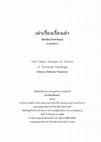
This article aims at positioning Kukrit Pramoj’s “Mhom” within the context of memory culture and ... more This article aims at positioning Kukrit Pramoj’s “Mhom” within the context of memory culture and screen culture. It also hopes to authenticate “Mhom” ’ s potential as a memory text which revives World War II memory repressed by the state’s official memory. The study reveals that on the one hand “Mhom” , canonized through school textbooks, tended to be interpreted with the focus on human- animal relationship. This mainstream interpretation prevents World War II memory from being fully articulated; it has to be expressed through abjection instead. On the other hand, Mhom, the television series (2017) not only refabricates prosthetic memory of World War II by bridging the front line and home front, but also foregrounds humanity which enhances audiences’ empathy in the context of mass culture. Mhom, therefore, successfully functions as both a memory text and a screen adaptation, which in turn reflects the study’ s exemplary attempt to connect memory studies with adaptation studies.
Natthanai Prasannam. 2016. World War II in Boonpong, the Television Biopic: Counter-Memory and Tr... more Natthanai Prasannam. 2016. World War II in Boonpong, the Television Biopic: Counter-Memory and Transnational Memory. Silapawatthanatham, 37.7 (May): 130-149
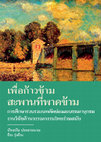
This research aims at compiling abstracts and bibliography of research on contemporary Thai liter... more This research aims at compiling abstracts and bibliography of research on contemporary Thai literature conducted in Thailand during 1990-2011. The number of the researches is 823 items. The researches can be divided into 9 groups: 1) fiction: novels 2)
fiction: short stories 3) non-fiction 4) poetry 5) song lyrics 6) plays 7) para-literature 8) integrated genres and 9) sociology of literature. The research synthesis reveals that an increasing number of researches is influenced by the rise of graduate studies in Thai language
and literature along with textual utilization by transdisciplinary researchers. The other significant findings indicate interrelationship between new media and reading public as
shown in the expansion of data selection. It is also found that the main approach is the
Empirical Study of Literature (ESL) based upon text-context orientation. The major concern of such research is aesthetics while interdisciplinary approaches have also grown more
important.
"พิพิธพรรณวรรณา: ความทรงจำและสยาม-ไทยศึกษาในบริบทสากล"
This article aims at studying marginal people in urban spaces, represented in selected modern Tha... more This article aims at studying marginal people in urban spaces, represented in selected modern Thai poetry.The analysis focuses on representation of prostitutes, needy children and
beggars. It is found that the poets portray marginality based on intersection between class, gender and age inferiority which segregates marginal people from their urban socio-cultural
resources. The poets represent marginal people through various literary devices and humanitarian lens. This study reveals the relationships between Thai poets and their social context. However, representation of the marginal people, found in modern Thai poetry, is still stereotypical. This finding may problematize aesthetics and assertion of human’s subjectivity which could possibly be controversial.
Natthanai Prasannam. , 2007
"This article proposes a postcolonial revisit of Thai classical literature. The texts used are va... more "This article proposes a postcolonial revisit of Thai classical literature. The texts used are various nirat poems as well as Khun Chang-Khun Phaen. The revisit is likely to unfold a power relationship between the center and its periphery in nirat, a Thai genre of travel writing. The poets construct the margin into an unfamiliar land conquered by the central power. In Khun
Chang-Khun Phaen, the poets devalue Lao culture and use feminine weakness to represent Lao-ness whereas Thai-ness is depicted through masculine strength. The postcolonial revisit of the selected texts could also illustrate the Thai conception of otherness with regard to ethnicity as well as the existence of power beneath the texts."
This article aims to survey research on contemporary Thai literature conducted by researchers fro... more This article aims to survey research on contemporary Thai literature conducted by researchers from other disciplines. The survey focuses on significance of findings as constructive pathway and pursuit of body knowledge on contemporary Thai literature. It is found that contemporary writings were utilized as corpus in the transdisciplinary research such as foreign languages and literatures, history, political science, communication arts, education, etc. The transdisciplinary research can contribute to literary researchers in several aspects: extension of data selection, utilization of alternative critical theory, new findings which can be used for literary studies. To be more inclusive, the prosperous research on contemporary Thai literature should also rely on transdisciplinary knowledge.

Journal of Mekong Societies , 2012
"This article aimed to study Luang Vichit Vadakarn’s Jao Mae Jamaree as an Imperialist romance wi... more "This article aimed to study Luang Vichit Vadakarn’s Jao Mae Jamaree as an Imperialist romance with a Postcolonial approach. It found that the novel is influenced by Western Imperialist romances in terms of fictional elements and Imperialist ideology.
The author justifies symbolic procession over the Mekong region through a male protagonist who pioneers the lost city of Jamaree as a “virgin land” and socializes a female protagonist with Thainess. The decline of Jamaree at the end of the story implies the destruction of the otherness in the arena of the Thai empire. This concept subsequently became Luang Wichit Wathakan’s colonial discursive practice against neighboring countries during Phibulsongkhram’s regime. Ultimately, Jao Mae Jamaree reproduces discourses on the glory of the Thai empire throughout Imperialist logic tied with sexuality and subtle political connotations."

The article seeks to examine Judy Chan’s A Walk through the Spring in terms of correlation betwee... more The article seeks to examine Judy Chan’s A Walk through the Spring in terms of correlation between narratives and the construction of Cantonese diasporic identity in the Thai social context. It is found that the novel is built upon a history of Chinese immigration told from the perspective of “inherited family narrative”. The novel, however, challenges a mainstream/malestream discourse on Chinese diaspora in Thailand, which often concentrates on the building-up-a-fortune achievements of Chaozhou men and which has long dominated the Chinese-Thai narratives. The author selects “herstory” to construct a Cantonese diasporic identity which embodies feminine culinary sphere and sensitive temperament. The feminist ideal of sisterhood also helps reconstruct a Cantonese identity, as reflected in the relationship among generations of Cantonese women which is bound by the memory of “grandmothers” and which is significant in shaping the identity of female characters in the novel.
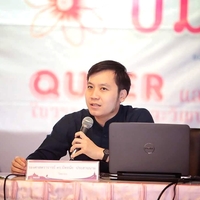










Uploads
Papers by Natthanai Prasannam
Natthanai Prasannam
Abstract
This article hopes to explore Bacteria’s A Tale of Thousand Stars (2016) with special reference to military masculinity and nationhood under the signifying system of the military romance. It is found that military masculinity is constructed through the image of man in uniform, desired muscularity along with the role of protecting Alpha. The characteristics validate the re-emergence of militarism in Thai popular culture after the coup d’état in 2014. The connotation of nationhood is rooted within uke’s vulnerable body conjuring the military protection. It also employs courtly love trope to illuminate seme’s loyalty to certain national institutions. In creating military masculinity and nationhood, the novel represents the otherness of periphery and the ethnic group through the urban vs rural dichotomy. Furthermore, the gendered rural space gives birth to uke’s new life: from feminized geo-body to masculinized body subjugating the rural world which embodies ethnic otherness, femininity, and childlike naivety.
Citation: Prasannam, N. (2021). Military Masculinity and Nationhood in the Yaoi Novel A Tale of Thousand Stars. Journal of Human Sciences, 22(1), 162-180.
Abstract
Yaoi is the romance depicting male homosexual relationship mostly reimagined by female writers. Despite their homosexual contents, yaoi texts practice gender distancing. That is, the texts disregard the heterosexual relationship without defining their alternative romantic love through gay identities. This article hopes to analyze the politics behind gender distancing in the Thai yaoi novel through literary convention and interpretation of yaoi—in the lens of textualism and mode of reception. The analytical frame is conceived within the marriage between yaoi studies and popular romance studies. The case study is LazySheep’s The Read Thread (Dai Daeng). The analysis exposes the perpetual existence of gender distancing within the yaoi debates. The politics in literary convention of yaoi is to subscribe and challenge heteronormativity while simultaneously subverting homonormativity through the textual logic. As a Thai reincarnation romance, The Red Thread reassures the protagonists’ blessed reunion in their next lives rather than the assertion of gay identity. That is, Thai yaoi novels tend to endorse the pure love ideal beyond the ties of all genders or social issues.
The National Library of Thailand Journal
Natthanai Prasannam (2019)
This article aims at analyzing the Thai yaoi novel by exploring terminological problems derived from the Japanese context and situating the genre under the grammar of fiction and the romance novel. The analytical demonstration is conducted with MAME’s My Accidental Love Is You. The selected novel recounts the homoerotic relationship among male university students representing the nature of the yaoi genre in Thailand. Regarding the Thai yaoi novel as a well-made novel, the article analyzes its elements of fiction. The analysis of the novel’s structure within the plot development is embarked to extract the formula of the romance novel. The result should reaffirm the characteristics of the yaoi genre underlining the formula as well as its function indulging readers in an escape rather than offering a realistic substance.
fiction: short stories 3) non-fiction 4) poetry 5) song lyrics 6) plays 7) para-literature 8) integrated genres and 9) sociology of literature. The research synthesis reveals that an increasing number of researches is influenced by the rise of graduate studies in Thai language
and literature along with textual utilization by transdisciplinary researchers. The other significant findings indicate interrelationship between new media and reading public as
shown in the expansion of data selection. It is also found that the main approach is the
Empirical Study of Literature (ESL) based upon text-context orientation. The major concern of such research is aesthetics while interdisciplinary approaches have also grown more
important.
beggars. It is found that the poets portray marginality based on intersection between class, gender and age inferiority which segregates marginal people from their urban socio-cultural
resources. The poets represent marginal people through various literary devices and humanitarian lens. This study reveals the relationships between Thai poets and their social context. However, representation of the marginal people, found in modern Thai poetry, is still stereotypical. This finding may problematize aesthetics and assertion of human’s subjectivity which could possibly be controversial.
Chang-Khun Phaen, the poets devalue Lao culture and use feminine weakness to represent Lao-ness whereas Thai-ness is depicted through masculine strength. The postcolonial revisit of the selected texts could also illustrate the Thai conception of otherness with regard to ethnicity as well as the existence of power beneath the texts."
The author justifies symbolic procession over the Mekong region through a male protagonist who pioneers the lost city of Jamaree as a “virgin land” and socializes a female protagonist with Thainess. The decline of Jamaree at the end of the story implies the destruction of the otherness in the arena of the Thai empire. This concept subsequently became Luang Wichit Wathakan’s colonial discursive practice against neighboring countries during Phibulsongkhram’s regime. Ultimately, Jao Mae Jamaree reproduces discourses on the glory of the Thai empire throughout Imperialist logic tied with sexuality and subtle political connotations."
Natthanai Prasannam
Abstract
This article hopes to explore Bacteria’s A Tale of Thousand Stars (2016) with special reference to military masculinity and nationhood under the signifying system of the military romance. It is found that military masculinity is constructed through the image of man in uniform, desired muscularity along with the role of protecting Alpha. The characteristics validate the re-emergence of militarism in Thai popular culture after the coup d’état in 2014. The connotation of nationhood is rooted within uke’s vulnerable body conjuring the military protection. It also employs courtly love trope to illuminate seme’s loyalty to certain national institutions. In creating military masculinity and nationhood, the novel represents the otherness of periphery and the ethnic group through the urban vs rural dichotomy. Furthermore, the gendered rural space gives birth to uke’s new life: from feminized geo-body to masculinized body subjugating the rural world which embodies ethnic otherness, femininity, and childlike naivety.
Citation: Prasannam, N. (2021). Military Masculinity and Nationhood in the Yaoi Novel A Tale of Thousand Stars. Journal of Human Sciences, 22(1), 162-180.
Abstract
Yaoi is the romance depicting male homosexual relationship mostly reimagined by female writers. Despite their homosexual contents, yaoi texts practice gender distancing. That is, the texts disregard the heterosexual relationship without defining their alternative romantic love through gay identities. This article hopes to analyze the politics behind gender distancing in the Thai yaoi novel through literary convention and interpretation of yaoi—in the lens of textualism and mode of reception. The analytical frame is conceived within the marriage between yaoi studies and popular romance studies. The case study is LazySheep’s The Read Thread (Dai Daeng). The analysis exposes the perpetual existence of gender distancing within the yaoi debates. The politics in literary convention of yaoi is to subscribe and challenge heteronormativity while simultaneously subverting homonormativity through the textual logic. As a Thai reincarnation romance, The Red Thread reassures the protagonists’ blessed reunion in their next lives rather than the assertion of gay identity. That is, Thai yaoi novels tend to endorse the pure love ideal beyond the ties of all genders or social issues.
The National Library of Thailand Journal
Natthanai Prasannam (2019)
This article aims at analyzing the Thai yaoi novel by exploring terminological problems derived from the Japanese context and situating the genre under the grammar of fiction and the romance novel. The analytical demonstration is conducted with MAME’s My Accidental Love Is You. The selected novel recounts the homoerotic relationship among male university students representing the nature of the yaoi genre in Thailand. Regarding the Thai yaoi novel as a well-made novel, the article analyzes its elements of fiction. The analysis of the novel’s structure within the plot development is embarked to extract the formula of the romance novel. The result should reaffirm the characteristics of the yaoi genre underlining the formula as well as its function indulging readers in an escape rather than offering a realistic substance.
fiction: short stories 3) non-fiction 4) poetry 5) song lyrics 6) plays 7) para-literature 8) integrated genres and 9) sociology of literature. The research synthesis reveals that an increasing number of researches is influenced by the rise of graduate studies in Thai language
and literature along with textual utilization by transdisciplinary researchers. The other significant findings indicate interrelationship between new media and reading public as
shown in the expansion of data selection. It is also found that the main approach is the
Empirical Study of Literature (ESL) based upon text-context orientation. The major concern of such research is aesthetics while interdisciplinary approaches have also grown more
important.
beggars. It is found that the poets portray marginality based on intersection between class, gender and age inferiority which segregates marginal people from their urban socio-cultural
resources. The poets represent marginal people through various literary devices and humanitarian lens. This study reveals the relationships between Thai poets and their social context. However, representation of the marginal people, found in modern Thai poetry, is still stereotypical. This finding may problematize aesthetics and assertion of human’s subjectivity which could possibly be controversial.
Chang-Khun Phaen, the poets devalue Lao culture and use feminine weakness to represent Lao-ness whereas Thai-ness is depicted through masculine strength. The postcolonial revisit of the selected texts could also illustrate the Thai conception of otherness with regard to ethnicity as well as the existence of power beneath the texts."
The author justifies symbolic procession over the Mekong region through a male protagonist who pioneers the lost city of Jamaree as a “virgin land” and socializes a female protagonist with Thainess. The decline of Jamaree at the end of the story implies the destruction of the otherness in the arena of the Thai empire. This concept subsequently became Luang Wichit Wathakan’s colonial discursive practice against neighboring countries during Phibulsongkhram’s regime. Ultimately, Jao Mae Jamaree reproduces discourses on the glory of the Thai empire throughout Imperialist logic tied with sexuality and subtle political connotations."
regulates women’s duty in domestic sphere. Thus, Thai didactic literature explicitly functions as discursive practice for perpetuating patriarchal ideology in Thai society.